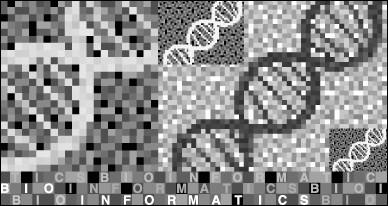Bioinformatics: wave of the future
Bioinformatics: wave of the future McGill University
User Tools (skip):
Bioinformatics: wave of the future

| In the classic film, The Graduate, Benjamin Braddock, fresh from ending his university studies, is taken aside by Mr. McGuire. "I just want to say one word to you — just one word," McGuire tells him. "Plastics. There's a great future in plastics."
If a worldly medical scientist came upon a contemporary version of Braddock today, he might utter, "Just one word. Bioinformatics. There's a great future in bioinformatics."
The University's budding McGill Centre for Bioinformatics recently received the green light from Senate and Vice-Principal (Academic) Luc Vinet, and the deans of medicine, science, agricultural and environmental sciences and engineering are currently busy looking for the researchers with the specialized skills to make McGill a powerhouse in this emerging field.
Vinet says McGill's decision to focus on this area is "a total no-brainer. The impact that this field will have on biomedical research can't be overstated."
So what is bioinformatics?
In a nutshell, it combines computer science with biology and genetics, with a good-sized dollop of mathematics, statistics and other medical specialties thrown into the mix. As geneticists, microbiologists and other researchers continue to gather huge amounts of new information about the human genome and biological molecules, there is a growing need for sophisticated, computerized approaches for compiling and analyzing that data.
The process by which that is done is called bioinformatics.
"Every major university in the world is trying to get its share of this pie," says Professor Denis Thérien, director of the School of Computer Science.
"McGill is in a very good position to establish itself in this area. We have one of the best faculties of medicine in the world. And, of course, a very dynamic School of Computer Science," laughs Thérien.
He says industry, particularly the pharmaceutical industry, has a strong interest in bioinformatics as well. More precise data about the way the human body functions at the micro-level leads to more effective drug therapies. Drug companies are a potential deep-pocketed ally. "The centre of pharmaceutical research is in Montreal," Thérien notes.
Industry isn't the only potential source of funding. Thérien says multi-million dollar grant applications are being prepared for foundations with a growing interest in this line of research, and Vinet believes that the centre stands an excellent chance of attracting funding from Quebec and federal granting agencies as well.
Planning for the centre began in earnest last fall when Associate Dean of Medicine Robert Mackenzie invited about 20 McGill researchers to discuss what the University should do in regard to bioinformatics.
The meeting resulted in the formation of an ad hoc committee headed by biomedical engineering professor Rob Kearney. Thérien was one of the members of the group. A draft proposal for a new centre was placed on the web in late December. After receiving several suggestions from colleagues, Thérien prepared a final proposal that Vinet and Senate endorsed.
Thérien says the process provided a welcome opportunity to assemble researchers who've rarely worked together in the past.
"I've been at McGill for 22 years and I met people I had never seen before. [The medical researchers] are up the hill, we're down the hill. This field doesn't belong to medicine. It doesn't belong to computer science. This has to be a joint venture between people who don't normally talk all that much."
Thérien says there is no shortage of interest in the centre from McGill faculty. Professors from the departments of Anatomy and Cell Biology, Human Genetics, Biomedical Engineering, Pharmacology and Therapeutics, Physiology, Biochemistry, Pediatrics, Microbiology, the Institute of Parasitology, the Cancer Research Centre and the Montreal Neurological Institute have all signed on to become active members of the centre.
That's a good mix of expertise, but McGill will also need full-fledged bioinformaticians — researchers with technical, analytical and biological expertise — to make the centre work. "It's a very new field and there aren't too many of them around yet," says Thérien. "You need people with a deep acquaintance with biology and the biomedical vocabulary coupled with very strong computational skills."
The University recently recruited its first bioinformatician for the centre — new computer science professor Michael Hallett. Vinet says the University is close to signing up another promising bioinformatician as a joint appointment between computer science and the Department of Mathematics and Statistics.
While the centre's primary orientation will be towards research, Thérien expects it will also be involved in helping different departments develop teaching programs related to bioinformatics.
"There is a pressing need to train people. There are too many jobs and not enough people to fill them."
The next priority for the centre's developers will be to recruit a director who is internationally recognized for his work in bioinformatics. Vinet says he will be looking for a high-profile academic to jumpstart the centre, an appointment along the lines of Desmond Morton (McGill Institute for the Study of Canada) and Peter Brown (McGill School of Environment).
Vinet isn't too worried about the hunt. "One thing I've learned since arriving at McGill is that we succeed in attracting top level people."

